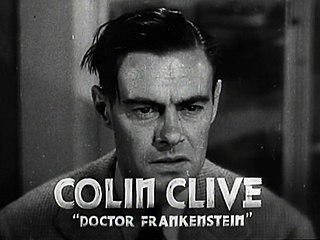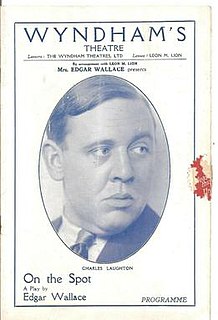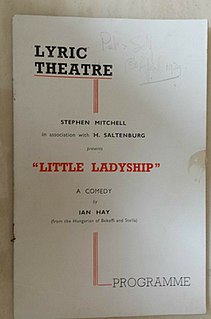Related Research Articles

Colin Clive was a British stage and screen actor. His most memorable role was Henry Frankenstein, the creator of the monster, in the 1931 film Frankenstein and its 1935 sequel, Bride of Frankenstein.

John Peter Wearing is an Anglo-American theatre historian and professor, who has written numerous books and articles about nineteenth and twentieth-century drama and theatre, including The Shakespeare Diaries: A Fictional Autobiography, published in 2007. He has also written and edited well-received books on George Bernard Shaw, Arthur Wing Pinero, extensive reference series on the London theatre from 1890 to 1980, and theatrical biographies, among other subjects. As a professor of English literature, Wearing has specialised in Shakespeare and modern drama.

George Laurier Lister, OBE was an English theatre writer, actor, director and producer, best known for a series of revues presented in London in the late 1940s and 1950s. He was later associated with Laurence Olivier in the West End and at the Chichester Festival. From 1964 to 1975 he was director and administrator of the Yvonne Arnaud Theatre in Guildford.
Touch Wood is a play by the British writer Dodie Smith. It ran for 213 performances during its initial run at the Haymarket Theatre between May and November 1934. A drama about a love triangle, the original cast included Ian Hunter, Dorothy Hyson, Desmond Tester, Flora Robson, Frank Pettingell and Marie Ney. It was produced by the theatrical impresario Basil Dean.
Call It a Day is a play by the British writer Dodie Smith first staged in 1935. Her most successful play, its initial West End run at the Globe Theatre lasted for 509 performances. The original cast included Owen Nares, Fay Compton, Austin Trevor, Muriel George, Patricia Hilliard, Valerie Taylor and Marie Lohr. The play was produced by the impresario Basil Dean. In 1936 it transferred to Broadway where it ran for 194 performances at the Morosco.

On the Spot is a 1930 Chicago-set play by the British writer Edgar Wallace. Wallace was inspired by a visit to the United States and, in particular, the Saint Valentine's Day Massacre. Known as a prolific author, he reportedly dictated the manuscript for the play in just four days. It was his greatest theatrical success.
The Calendar is a 1929 play by the British writer Edgar Wallace. It is a crime thriller set in the world of horse racing world, the sport being among Wallace's interests. The protagonist is a financially struggling racehorse owner with a shady reputation. It premiered at the Palace Theatre in Manchester before transferring to Wyndham's Theatre in the West End.
The Mouthpiece is a 1930 crime play by the British writer Edgar Wallace. It was one of several theatrical failures written by Wallace following the enormous success of On the Spot, with a plot described as "flimsy".
M'Lady is a 1921 play by the British writer Edgar Wallace. It is a drama about a woman who tries to raise her daughter in high society, only for her husband to return from Broadmoor where he has been serving a sentence for killing a police officer. It was panned by theatre critics.
Smoky Cell is a thriller play by the British writer Edgar Wallace first staged in 1930. In America a group of detectives hunt down a notorious racketeer.

Viceroy Sarah is a 1935 historical play by the British writer Norman Ginsbury. It is based on the relationship between Sarah, Duchess of Marlborough and Queen Anne during the time of the War of the Spanish Succession.

Little Ladyship is a 1939 comedy play by the British writer Ian Hay.

A Present from Margate is a 1933 British comedy play by Ian Hay and A.E.W. Mason.
Admirals All is a 1934 adventure comedy play by the British writers Ian Hay and Stephen King-Hall about a film star who becomes mixed up with the Royal Navy and Chinese pirates.
Leave it to Psmith, subtitled "A comedy of youth, love and misadventure", is a 1930 comedy play by Ian Hay and P. G. Wodehouse, based on the latter's 1923 novel of the same title. It premiered in London's West End at the Shaftesbury Theatre on 29 September 1930.
Orders Are Orders is a 1932 comedy play by the British writers Ian Hay and Anthony Armstrong. A Hollywood film crew takes over a British Army barracks for a film shoot, with chaotic consequences.
Good Losers is a British mystery play by Michael Arlen and Walter C. Hackett.
Take a Chance is a comedy play by the British-American writer Walter C. Hackett, with a plot revolving around gambling on a horseracing.
Can the Leopard...? is a 1931 comedy play by the British writer Ronald Jeans. The title refers to the expression "Can the leopard change its spots?" and features a husband forlornly attempting to reform his wife's reckless ways. The New Statesman review considered the plot to be weak, and relied for its success on the acting quality of the cast.

Joan White (1909-1999) was a British actress, theatre director and educator who over a career that spanned 65 years became a popular figure on the London stage, appeared in films and television and produced and directed plays on both sides of the Atlantic, and trained many of the young to follow in her footsteps. She worked with actors such as Laurence Olivier, Paul Scofield, Tyrone Guthrie, and Christopher Fry in their successes, and with others such as Rex Harrison, Mischa Auer and Tyrone Guthrie in their failures. As a master of the art of high comedy she entertained numberless audiences, and through her students left an indelible mark on the future of her profession.
References
- ↑ Wearing p.16